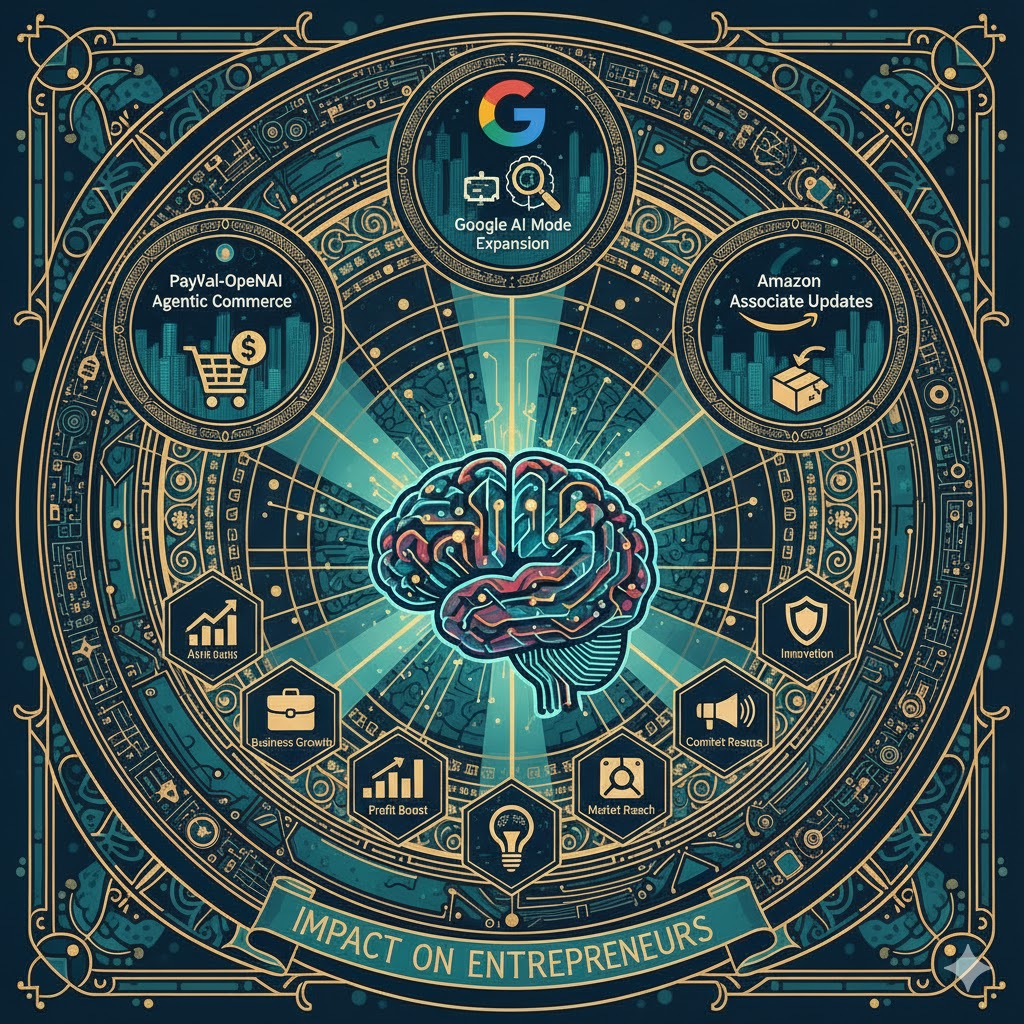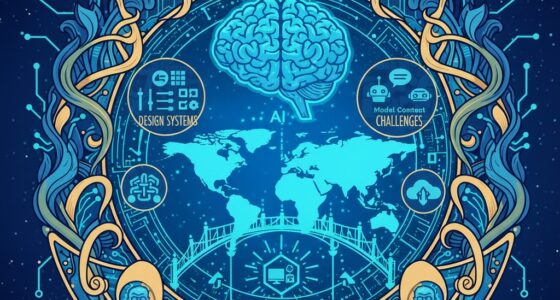Introduction
Artificial intelligence (AI) is reshaping how consumers discover, evaluate and purchase products. October 2025 saw three major announcements signalling that AI‑driven commerce is moving from concept to reality:
- PayPal–OpenAI partnership: PayPal will embed its digital wallet and merchant network into ChatGPT via the Agentic Commerce Protocol (ACP). Beginning in 2026, ChatGPT users will be able to find products and complete purchases using PayPal without merchants building individual integrationssiliconrepublic.comfinancemagnates.com.
- Google AI Mode expansion: Google announced that its conversational AI Mode in Search is now available in over 35 new languages and 40+ new countries, bringing availability to more than 200 territoriesblog.google. AI Mode uses Gemini models to deliver multimodal, reasoning‑based responses; early data shows that people ask queries nearly three times longer than traditional searchesblog.google.
- Amazon Associates Program update: On 15 October 2025, Amazon revised its Associates Program Operating Agreement and Program Policies. Updates included stricter trademark and copyright rules, revised commission calculations and expanded product exclusionsaffiliate-program.amazon.com. The changes are impacting affiliate creators and small businesses who rely on Amazon commissionslogie.ai.
Entrepreneurs operating content, affiliate or e‑commerce businesses must understand how these shifts interact. This report analyses the new developments and provides actionable recommendations.
1. PayPal–OpenAI Agentic Commerce: a New Channel for Small Merchants
What is Agentic Commerce?
Agentic commerce refers to shopping interactions mediated by AI agents rather than direct website visits. A McKinsey report predicts that up to US$1 trillion of U.S. B2C spending (and up to $3‑5 trillion globally) could flow through AI agents by 2030mckinsey.com. These agents anticipate needs, negotiate with sellers and complete transactions on behalf of users. Interoperability protocols such as OpenAI’s Agentic Commerce Protocol (ACP), Google’s AP2 and Visa’s Trusted Agent Protocol are emerging standardsventurebeat.com. For merchants, the challenge is to expose product catalogs and checkout flows to multiple platforms without building custom integrations for each.
PayPal’s ACP Integration with ChatGPT
PayPal’s October 2025 announcement makes it the first digital wallet integrated into ChatGPT. Key details include:
- Instant checkout: ChatGPT users will be able to pay with PayPal using bank accounts, balances or cards, and benefit from PayPal’s buyer and seller protectionsfinancemagnates.com. PayPal will handle post‑purchase services such as tracking and dispute resolutionfinancemagnates.com.
- Merchant catalog integration: PayPal will operate an ACP server that ingests product catalogs from small businesses and large brands across categories like apparel, fashion, beauty, home improvement and electronicssiliconrepublic.com. Merchants will not need bespoke integrations; PayPal manages routing, payment validation and orchestrationsiliconrepublic.com.
- Launch timeline: The integration begins in 2026. In the interim, merchants can sign up to have their catalogs includedsiliconrepublic.com.
Implications for Entrepreneurs
Opportunities:
- Expanded reach without building an app: Small merchants using PayPal will become discoverable in ChatGPT searches. Millions of consumers who ask ChatGPT for recommendations can browse products and check out instantly. PayPal emphasises that even its smallest merchants will be discoverablesiliconrepublic.com.
- Lower integration complexity: PayPal’s ACP server handles the heavy lifting. Entrepreneurs do not need to build a ChatGPT plugin; instead they upload their product catalog (e.g., via PayPal’s Shop Sync) and accept payments via PayPalventurebeat.com.
- Agent Ready and Shop Sync services: PayPal is launching tools like Agent Ready and Shop Sync. Agent Ready enables merchants to accept payments across AI assistants; Shop Sync provides AI platforms with structured product informationventurebeat.com.
Challenges and considerations:
- Reduced direct traffic: Agentic commerce may bypass merchants’ websites. Customers might complete the entire purchase inside ChatGPT, which reduces opportunities to cross‑sell or nurture brand loyalty. Retailers must focus on high‑quality product data and metadata to ensure their items are recommended by AI agentsforbes.com.
- Data privacy and trust: AI agents handle personal data and payment credentials. Businesses must ensure compliance with data protection regulations (e.g., GDPR) and be transparent about data use to maintain customer trustentrepreneur.com.
- Platform fragmentation: Multiple agentic protocols (ACP, AP2, Visa protocols) mean merchants may need to support several standardsventurebeat.com. Tools like PayPal’s can simplify, but businesses should avoid platform lock‑in.
- Disintermediation risk: If ChatGPT’s agent recommends products from multiple retailers, price and availability may dominate over brand story. Businesses must invest in strong brand presence across channels (social, email, community) to retain direct relationshipsforbes.com.
Actionable Recommendations
- Prepare structured product data: Ensure your inventory has rich metadata—titles, descriptions, images, pricing and availability—structured using schema.org or similar standards. PayPal’s system will rely on structured data to match queries with relevant products.
- Monitor ChatGPT exposure and pricing: Once available, track how often your products appear in ChatGPT recommendations and at what prices. Adjust product descriptions and titles based on frequently asked questions.
- Use PayPal Agentic Commerce sign‑up: Register early to have your catalog included. Investigate whether your e‑commerce platform supports integration with PayPal’s Shop Sync or Agent Ready.
2. Google AI Mode Expansion: Redefining Search and SEO for Entrepreneurs
Features and Coverage
Google’s AI Mode is a conversational experience that appears as a dedicated tab within Google Search. The October 2025 expansion makes AI Mode available in 35+ new languages and over 40 new countries, lifting coverage to over 200 countries and territoriesblog.google. Gemini models power advanced reasoning, enabling AI Mode to understand complex, multimodal queries. Users ask questions nearly three times longer than traditional searches, and AI Mode responds with step‑by‑step guides, images, charts and action buttonsblog.google. It supports text, voice and image inputs and can access authorised app data for tasks like bookingstheegg.com.
Comparison with AI Overviews
AI Mode differs from Google’s AI Overviews (AIO) in several ways:
- Brand visibility: AI Mode features brands in about 90 % of answers, surfacing 3.8 times more unique brands than AI Overviews, which show brands in only 43 % of casestheegg.com. This means small businesses have greater chance of being mentioned directly in AI Mode.
- Information gathering: AI Overviews summarise information from top search results, whereas AI Mode uses a “query fan‑out” approach to access broader and real‑time datatheegg.com. AI Mode typically references 5–7 source cards, making it more stable and predictabletheegg.com. In contrast, AIO citations are more volatile and often exclude top organic results. A study found that AIO reduces click‑through rates by 34.5 % and that 93.8 % of citations are not from the top 10 organic resultsdigitalmarketinginstitute.com.
- Agentic capabilities: AI Mode can trigger actions (e.g., book appointments, order products) within search. This function, sometimes referred to as “agentic search,” hints at future integration with payment protocols like PayPal’s ACPtheegg.com.
Impact on Search Behaviour and Traffic
- Zero‑click experiences: Users increasingly obtain answers within AI Mode or AI Overviews, reducing visits to individual websites. AIO alone has more than 2 billion users and appears in over 30 % of U.S. queriesdigitalmarketinginstitute.com. AI Mode may accelerate this trend because of its actionable suggestions (maps, ratings, purchase buttons)theegg.com.
- Longer, more complex queries: With conversational prompts, queries become multi‑sentence and context‑dependent. Businesses need content that answers nuanced questions rather than short keyword phrasesblog.google.
- Local and personalised results: AI Mode leverages user history, location and preferences. For local queries like “best plumber near me,” optimised Google Business Profiles and local SEO remain criticalhikeseo.co. Multilingual support means businesses can reach audiences in languages like German, French and Hindi.
Opportunities and Strategies for Entrepreneurs
- Structured, multimodal content: To appear in AI Mode, content should include structured data (FAQ, Product, How‑to schemas) and quality images, videos and chartstheegg.com. AI Mode uses this metadata to generate actionable snippets.
- Topical authority and trust: AI Mode prioritises authoritative sources. Building E‑E‑A‑T (Experience, Expertise, Authoritativeness, Trustworthiness) through high‑quality articles, transparent author bios and citations increases the likelihood of your brand appearing in AI answersthatware.co.
- Optimize for local and multilingual search: Translate key pages and product descriptions into languages relevant to your markets. Keep Google Business Profiles updated with accurate hours, reviews and imageshikeseo.co.
- Monitor AI visibility metrics: Traditional SEO metrics (click‑through rate, sessions) may decline as AI surfaces answers directlytheegg.com. Track impressions, citations and brand mentions within AI Mode to measure visibilitytheegg.com. Use tools or manual checks to see if your brand is cited.
- Shift content funnel strategies: According to The Egg, top‑of‑funnel informational queries are increasingly satisfied within AI summaries; thus, entrepreneurs should produce deeper mid‑ and bottom‑funnel content (comparisons, case studies, calls to action) where AI is less likely to resolve the query fullytheegg.com. This content should encourage sign‑ups, downloads or direct purchases.
- Diversify channels: Relying solely on organic traffic becomes risky. Build email lists, social channels and communities. Consider chat‑based experiences (e.g., a branded chatbot) so that your product can interact directly with consumers in agentic ecosystemsfortune.com.
3. Amazon Associates Program Updates: Tighter Compliance and Uncertain Revenues
Summary of October 2025 Changes
Amazon updated its Associates Program Operating Agreement and Program Policies effective 15 October 2025. Key changes includeaffiliate-program.amazon.com:
| Area | Change | Entrepreneurial impact |
|---|---|---|
| Trademark and copyright use | Associates cannot use copyrighted material from third‑party sellers without written authorizationaffiliate-program.amazon.com. Amazon has tightened guidelines for using logos and brand imagery. | Creators must remove unapproved logos and brand marks from videos, thumbnails and storefronts, or risk content removal and account suspensionlogie.ai. |
| Commission calculations | Commissions are rounded to the nearest currency unit at the per‑transaction levelaffiliate-program.amazon.com. Amazon can determine which products are excludedaffiliate-program.amazon.com. | Earnings may be lower than expected, and products previously eligible may become ineligible without noticelogie.ai. Tracking commissions weekly is essentiallogie.ai. |
| Payment thresholds | Gift card payment thresholds adjusted, with maximum amounts for payoutsaffiliate-program.amazon.com. | Small affiliates relying on gift card payouts need to meet new thresholds to receive funds. |
| Regional updates | Updated Canadian program to clarify free book promotions and updated EU agreements with new legal entity namesaffiliate-program.amazon.com. | Entrepreneurs operating internationally must ensure compliance across jurisdictions. |
Practical Consequences for Affiliates and Creators
The Logie.ai analysis highlights several real‑world impacts:
- Video and content rejection: Many creators noticed increased content rejection due to unapproved logos or imagerylogie.ai. Videos that previously passed review are now flagged, leading to delays during high‑traffic periods like Black Fridaylogie.ai.
- Storefront audits: Amazon’s automated systems now flag outdated product listings, disallowed trademarks or expired affiliate links. Entire storefronts may be deactivated without warninglogie.ai.
- Unexplained commission drops: Creators report sudden declines in commissions and missing bonuses. Some high‑traffic products have been quietly moved into the ineligible categorylogie.ai.
- Higher compliance burden: The new rules close loopholes and demand weekly audits of content and linkslogie.ai. Creators who remain vigilant will maintain earnings, while those who do not risk revenue losseslogie.ai.
Strategic Responses
- Audit and update content: Immediately review all top‑earning articles, videos and storefronts for unauthorized logos or language implying endorsement. Remove or replace unapproved trademarkslogie.ai.
- Monitor product eligibility: Maintain a spreadsheet of promoted products and cross‑check with Amazon’s product exclusion list. If key products become ineligible, replace them or negotiate direct partnerships with merchants.
- Adjust revenue forecasts: Because commission calculations may vary due to rounding and exclusions, model conservative revenue projections. Explore alternative affiliate networks or direct partnerships (e.g., brands that accept PayPal within ChatGPT).
- Leverage community knowledge: Join creator communities, webinars and forums to stay aware of policy enforcement trendslogie.ai.
4. Integrating Agentic Commerce and AI Search into Entrepreneurial Strategy
Convergence of Agentic Commerce and AI Mode
- Shopping discovery to checkout flow: The combination of Google’s AI Mode (for discovery) and ChatGPT with PayPal (for purchase) points to a future where AI assistants will handle the entire customer journey. A user may ask Google AI Mode for gift ideas and then instruct ChatGPT to purchase a selected item via PayPal. Entrepreneurs must ensure their products are accessible in both ecosystems.
- Protocol interoperability: PayPal adopts ACP, while Google is expected to support AP2 for agentic commerce. Merchants may need to implement multiple protocols, or rely on service providers like PayPal or payment gateways that abstract this complexityventurebeat.com.
- Competition and discovery: AI agents will compare products across retailers based on price, reviews and metadataforbes.com. This reduces advantages of brand loyalty and pushes businesses to compete on value, quality and data quality. Rich product information, competitive pricing and positive reviews will influence AI recommendations.
- Privacy and ethics: Entrepreneurial use of AI must consider data privacy. Consumers may be wary of AI systems making decisions on their behalf. Transparent data practices and opt‑in consent mechanisms will be importantentrepreneur.com.
Opportunities in Niche and Local Markets
AI Mode’s personalisation and local features mean that niche and local businesses can compete. For example, a local bakery using an AI‑powered ordering system that recommends seasonal treats increased upsells and streamlined inventory managemententrepreneur.com. Similarly, a hardware store using AI for inventory saved staff time and improved accuracyentrepreneur.com. Entrepreneurs should explore niche categories where they can build authority and deliver personalized service.
Building a Resilient Business Model
Given the above trends, entrepreneurs running affiliate or e‑commerce businesses should:
- Diversify income streams: Relying solely on Amazon Associates is risky. Explore direct merchant affiliate programs, digital products, or subscription services. PayPal’s ChatGPT integration will enable new sales channels; experiment with listing your products there.
- Develop proprietary AI experiences: Consider building your own chatbot or voice assistant that can interact with customers, answer questions and convert leads. This helps maintain brand identity in an agent‑mediated worldfortune.com. Retailers can also deploy AI tools for customer support and personalized recommendations.
- Invest in data and analytics: Create a robust data platform that aggregates product information, customer behaviour and inventory. High‑quality data powers better recommendations in AI platforms and helps you optimize pricing and promotionsfortune.com.
- Strengthen content and SEO fundamentals: Even with AI assistance, users will still click through for depth and comparison. Maintain comprehensive product guides, tutorials and reviews that satisfy user intent. Use schema markup, clear headings and FAQs to help AI understand your contenttheegg.com.
- Focus on community and loyalty: Build an email list, loyalty program or membership community. When AI search and agentic commerce reduce website visits, your owned channels become a vital way to maintain engagement and communicate promotions or new product launches.
Conclusion
The October 2025 announcements from PayPal, Google and Amazon mark a turning point in digital commerce. Agentic commerce moves checkout directly into conversational AI, offering small businesses unprecedented exposure but also introducing platform dependencies and disintermediation risks. Google’s AI Mode global rollout signals that traditional SEO is evolving into Generative Engine Optimisation (GEO)—optimising content so AI systems cite and recommend it. Amazon’s Associate updates tighten compliance and heighten revenue uncertainty for affiliates.
For entrepreneurs, these trends demand adaptation and agility. Early movers can leverage PayPal’s agentic services to reach ChatGPT users, optimize for Google’s AI Mode with structured, multilingual content, and diversify income beyond Amazon. Investing in high‑quality data, maintaining trust and privacy, and building direct customer relationships will be crucial. The businesses that embrace these changes will thrive in an AI‑driven commerce landscape; those that ignore them risk becoming invisible in the channels where customers increasingly shop and search.









